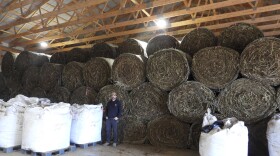A new bill in the Kentucky legislature could ban large-scale solar projects on farmland in the state, out of fears that the growing solar industry could be a detriment to the preservation of productive farmland. But a leading solar advocate in the state believes the bill is an overreaction and could significantly hamper the dawning solar industry.
Republican State Sen. Steve West said the bill filed Monday is his way to address a long-term problem of increasing development destroying prime farmland for future generations, with large solar installations adding to that pressure.
“What was once an income-producing property for the people of that county, is now possibly, you could say maybe an eyesore to the neighbor,” West said. He is also concerned that solar projects could degrade the farmland where projects are placed over time.
“Our farmland is one of our greatest resources, and so in effect if you allow these solar panels to go into an area, cover land, after their lifespan of 20-25 years, they’re filled with hazardous chemicals. It’s gonna be pretty tough from a monetary standpoint to redevelop that land into anything else but a solar installation,” West said.
West said he doesn’t oppose solar energy as a whole, and wouldn’t want his bill to prevent smaller solar installations on individual farms.
Aesthetic effects are, of course, in the eye of the beholder. But there does not appear to be much evidence that properly-maintained solar panels could lead to contamination. Researchers have raised concerns about the disposal of solar panels at the end of their lives, with the potential to leach lead into the ground in landfills. Other researchers have mentioned how poorly-made solar panels could leach chemicals if left on sites after being broken or damaged by extreme weather, such as hurricanes or hail. However, there does not appear to be much risk at the site of an installation. One study looking at whether solar panels posed a risk of leaching heavy metals during their lifetimes found no risk of harming nearby ecosystems.
One leading advocate for solar energy said as long as a developer takes proper steps to cover land with grass and other benign plants beneath the solar panels, there isn’t any risk of land degradation. Kentucky Solar Energy Society Chair Wallace McMullen believes the bill as written could stamp out the growing potential of solar in the state.
“It strikes me as being premature, and seems to be striking down with a sledgehammer a nascent, positive industry,” McMullen said. “This is an investment that’s going to help the local tax base, there’s rental income for the landowner.”
McMullen said he understands concerns about the preservation of farmland, but added that some forms of agriculture can take place on the same land as solar installations. He pointed to a pilot project from Louisville Gas & Electric last year to have sheep mow down grass surrounding a solar installation.
The Ohio Valley ReSource recently reported on a proposed large solar array in Clark County, Kentucky, which sparked debate over whether solar installations should be placed on farmland. West, a farmer and real estate attorney from nearby Bourbon County, said he hadn’t spoken with those in Clark County before introducing the bill, but was partly inspired by their situation.
The leader of a group opposing solar installations on farmland in Clark County hailed the bill as an affirmation for local control of solar energy.
“Specifically concerning the issue of solar, if communities want to protect their agricultural lands, local food systems and signature industries, this bill rightly affords them the opportunity to make such policy decisions,”said Will Mayer, executive director of the Clark Coalition.
Republican lawmakers in Ohio introduced a bill in December banning new large solar and wind projects for up to three years. West is unsure how much movement the bill will receive in the legislature given other pressing concerns including the pandemic and passing a new state budget, but he hopes the bill at least starts a conversation about the issue.





